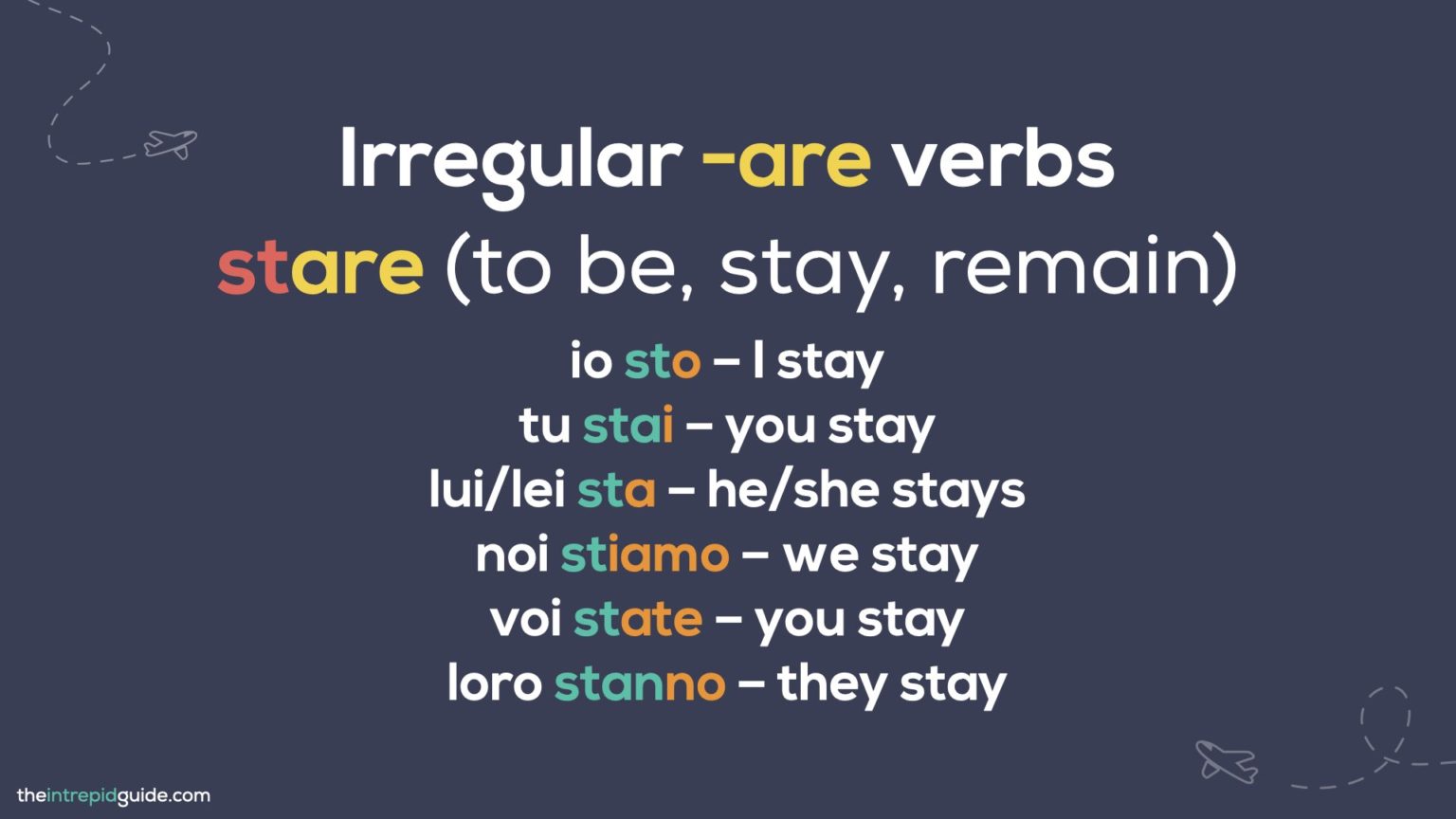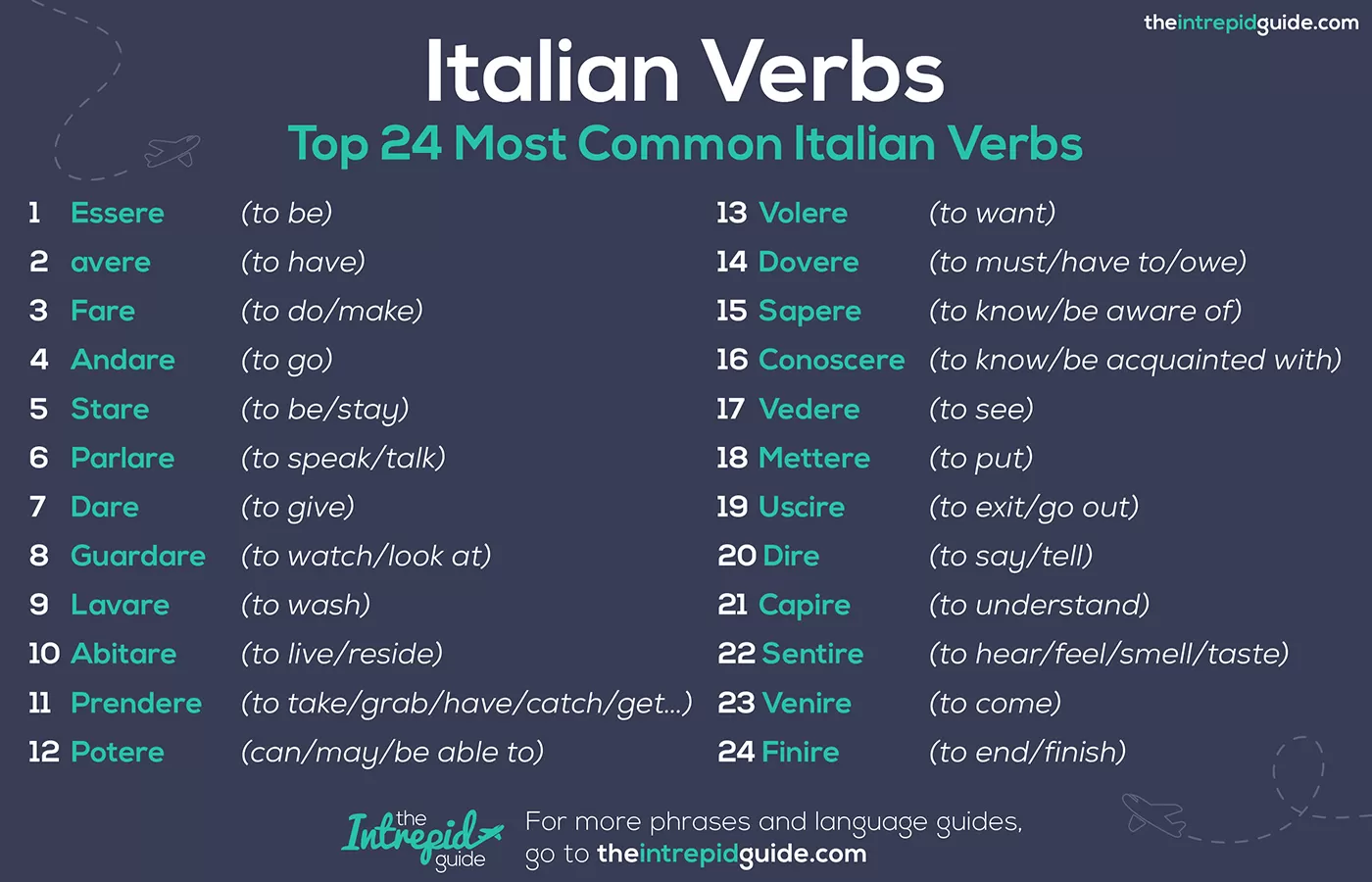
The Italian verb "Stare" YouTube
Moreover, stare is used to express an action in progress, as in Marco sta guardando un film (Marco is watching a movie). The last two instances require extra attention since the English equivalents would require the verb "to be". And remember that the progressive form is used in Italian only to emphasize that an event is happening right now.

VERBO STARE Verbo estar em italiano Lingua italiana 13 YouTube
'stare' conjugation table in Italian Go to the definition page of stare Indicative Subjunctive Imperative Infinitive stare Past Participle stato Gerund stando Indicative Present io sto tu stai lui/lei/Lei sta noi stiamo voi state loro stanno Imperfect io stavo tu stavi lui/lei/Lei stava noi stavamo voi stavate loro stavano Future

Conjugation Stare 🔸 Italian verb in passato prossimo, imperfetto
The verb stare literally means to stay, to be in a place (without moving) or to be in a particular condition, but also to live in a place or to be in a relationship. Depending on the situation, it can be translated as: to be, to remain, to stand, to be situated, to sit.

The present tense of the verb "STARE" In Italian this verb can be
The verb 'stare' is a very common Italian verb. It's also an irregular verb, so it's useful to understand how it works and which contexts to use it in. It can be used to talk about where someone or something is, how they are, what they are doing and what they are about to do, as well as being used in commands.

Conjugation Stare 🔸 Italian verb in passato prossimo, imperfetto
Italian verb 'stare' conjugated Cite this page | Conjugate another Italian verb Nominal Forms Infinito: stare Participio presente: stante Gerundio: stando Participio passato: stato Nominal Forms Infinito: essere stato Participio presente: essente stato Gerundio: essendo stato Indicativo Presente Passato prossimo Imperfetto Trapassato prossimo
/Making-pasta-58c187f43df78c353c28d0f5.jpg)
How to Conjugate the Verb "Stare" in Italian
THE VERB "STARE" IN ITALIAN The verb "stare" belongs to the group of irregular verbs in Italian like ESSERE (to be), AVERE (to have) and FARE (to do). If you don't know these verbs yet, watch the videos below to learn how to use them in the present tense. If you are here only for the verb "stare" then keep reading!

How to use Italian verb STARE YouTube
Being an Italian Verb Stare literally means "to stay," but it's also one of two Italian verbs that can mean "to be"* when talking about 1) Health Per esempio… 2) Permanent or habitual location Stare per + infinitive = very near future Stare is also used with the gerund to form progressive tenses (lessons coming soon).

Stare Conjugation How to Use Stare in Italian Learn Italian Go
Conjugation stare | Conjugate verb stare Italian | Reverso Conjugator Irregular verbs stare Infinito stare Gerundio stando Participio Passato stato Model : stare Auxiliary : essere Other forms: starsi / non stare Advertising Indicativo Presente io sto tu stai lei/lui sta noi stiamo voi state loro stanno Imperfetto io stavo tu stavi lei/lui stava

10 WAYS to use STARE in the PRESENT (Italian Verbs) YouTube
Stare is an extremely important Italian verb, which is often used in everyday conversation. Hence, it's crucial to get familiar with the stare conjugation and its different meanings. Depending on the situation, stare can be translated as: To stay To be To remain To be situated To live To be about to (when followed by a verb in the infinitive form).

Stare Conjugation How to Use Stare in Italian Learn Italian Go
Stare Italian verb conjugation | Conjugate verb stare | Verbo Italiano Italian Verbs Conjugation Type the verb you wish to conjugate (ie: mangiare, dormire, amare) stare Indicativo Presente io sto tu stai lui sta noi stiamo voi state loro stanno Passato Prossimo io sono stato tu sei stato lui è stato noi siamo stati voi siete stati loro sono stati

stare Conjugation of the verb “stare” schoLINGUA
Conjugation Italian verb stare 1st conjugation verb - stare is intransitive (essere auxiliary) stare feminine Translation stare stare to stay Indicativo (Indicative) Presente (Present) io st o tu st ai lui st a noi st iamo voi st ate loro st anno Passato prossimo (Present perfect) io sono st ato tu sei st ato lui è st ato noi siamo st ati

How to Conjugate Italian Verbs in 3 Simple Steps [Italian for Beginners
essere and stare In Italian there are two irregular verbs, essere and stare, that both mean to be. In the present tense they follow the patterns shown below: essere is the verb generally used to translate to be: Cosa sono? What are they? È italiana. She's Italian. Sono io. It's me. È un problema. It's a problem. Siete pronti? Are you ready?

Italian how to use "stare" and "essere" Differences Grammar A2/B1
Conjugate the Italian verb stare in all forms and with usage examples. Stare conjugation has never been easier! Conjugate the Italian verb stare in all forms and with usage examples.. Other Italian verbs with the meaning similar to 'stay': None found. Learning languages? Try Interlinear. Receive top verbs, tips and our newsletter free!

Top 24 Most Important Verbs in Italian (Plus PDF CheatSheet & Quiz) (2022)
stare: io sto, tu stai, lui/lei sta, noi stiamo, voi state, loro stanno. For now, just have a look at some sentences and see if you can tell the difference: Laura è molto intelligente. Laura is very intelligent. Loro sono spagnole. They are Spanish.

Stare to be, to stay 100 verbs in Italian! Learning italian, Italian
[ˈstare ] Full verb table intransitive verb (irregular) auxiliary verb: essere 1. (rimanere) to stay ⧫ be ⧫ remain stare in piedi to stand stare fermo to keep or stay still stare seduto to sit ⧫ be sitting stare disteso to lie stare zitto to keep or be quiet stai dove sei! stay where you are! stai ancora un po'! stay a bit longer!

Italian Conjugation Song Fare Stare Andare Dare Lingua Loops YouTube
Conjugation of Italian verb 'stare' Italian Verbs Course Free Course Posted June 20, 2019 by Madel Stare is an irregular, first conjugation verb that means to be, to stay. This is surely one of the most used Italian verbs.